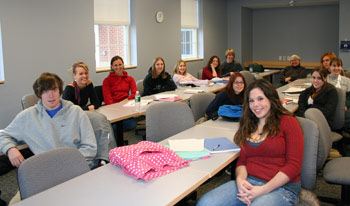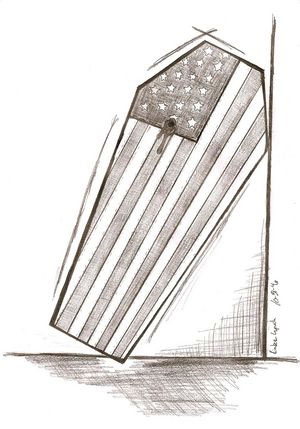Currents: an unexpected path
Soldiers in Iraq Touch the Hearts of Honors Students
The syllabus to Professor Ann Page Stecker's fall First Year Honors Pathway seminar begins with an invitation to new experiences. “Welcome to an adventure,” Stecker tells her students in “Betwixt and Between: An Introduction to College Honors." But a big part of the journey came as a surprise even to Stecker herself.

Stecker quickly learned that seven of her 14 students have special connections with people currently serving in the military in Iraq. These first-year students started on their own adventure when the topic of Iraq was first brought up. They engaged in rigorous debates whenever the issue was revisted in their class.
The News Hits Home
As part of their course work, Stecker's students read The New York Times every day. One student found that the “issues definitely can be more sensitive in our class now.” Another explained “I tend to pay more attention to the locations of where things are happening.” Knowing people in Iraq “makes me wonder what's biased in the news, and I know more of that to look for now.”
Besides reading the news, students keep in touch with the people they know in Iraq. The connections range from neighbors and good friends to close cousins, an uncle and an old boyfriend. Unlike in past wars, most communicate through electronic media, including e-mail and instant messenger. One student stays in contact through the soldier's parents.
Drawing on Experience

Kimber Lynch had reconnected with an old boyfriend before he was sent to Iraq. They touch base now about once a week, according to Lynch. “He is doing well. He was injured a little while ago, but he is recovering. He may be sent to Germany to get surgery. I'm still awaiting news.”
Lynch titled a recent drawing “When will it be Enough.” It depicts the coffin of an American soldier with a bullet hole through it. "It was one I did shortly after I found out that they weren't going to send my friend home, despite a gunshot wound, shrapnel wounds and some burns," she said. "It sort of shows how I feel about keeping him there, about how our loved ones are fighting through all of their injuries and how it doesn't seem like their health and well-being is thought of at all.
“Our soldiers get seriously injured and still have to continue to fight. The only way out is to die,” she continued. “That's how I was feeling at the time and, even though I understand more now, I still feel that way in some respects.”
Scott Overlock, who knows three people serving in Iraq, said that one of them, who is 19 years old, had "tension between people back here at first. From their perspective, we seem more careless. He recently came home for Thanksgiving and seems to have made sense of everything for himself now.”
Bridging a Divide
In class, students revealed that they are scared for their friends but assumed they have only a few months left to serve in Iraq. Lynch added, “It's hard to have a loved one fighting even after suffering so much.”
Some in the class, evenly divided in the class by their connections---or lack of them---with people in Iraq, worried that discussing their opinions of warfare might cause too much of a debate in a course that moves quickly over many topics. By the end of the semester, though, the Iraq discussions seemed to bring the class closer together.
“From the perspective of not knowing anyone over there, I stay up late paying attention to what's going on. I think I would be way more on top of it if I knew someone who was in Iraq," said Evan Thompson. "It affects how close you watch things.”
The close intellectual and emotional bond the students developed---one of the goals of the two-year Pathway curriculum---also tied into what was discussed in their Pathway seminar. War did not seem to go away even in discussing the novel they read for the class, Extremely Loud and Incredibly Close by Jonathan Foer. In the book, the protagonist's father dies in the terrorist attacks on the World Trade Center.
“For me, that day was a threshold when I found out how many people in my class know others in Iraq," said Professor Stecker. "I think the novel that we read fit in really well. I'm really glad it worked out this way.”
-- LARISSA DILLMAN


